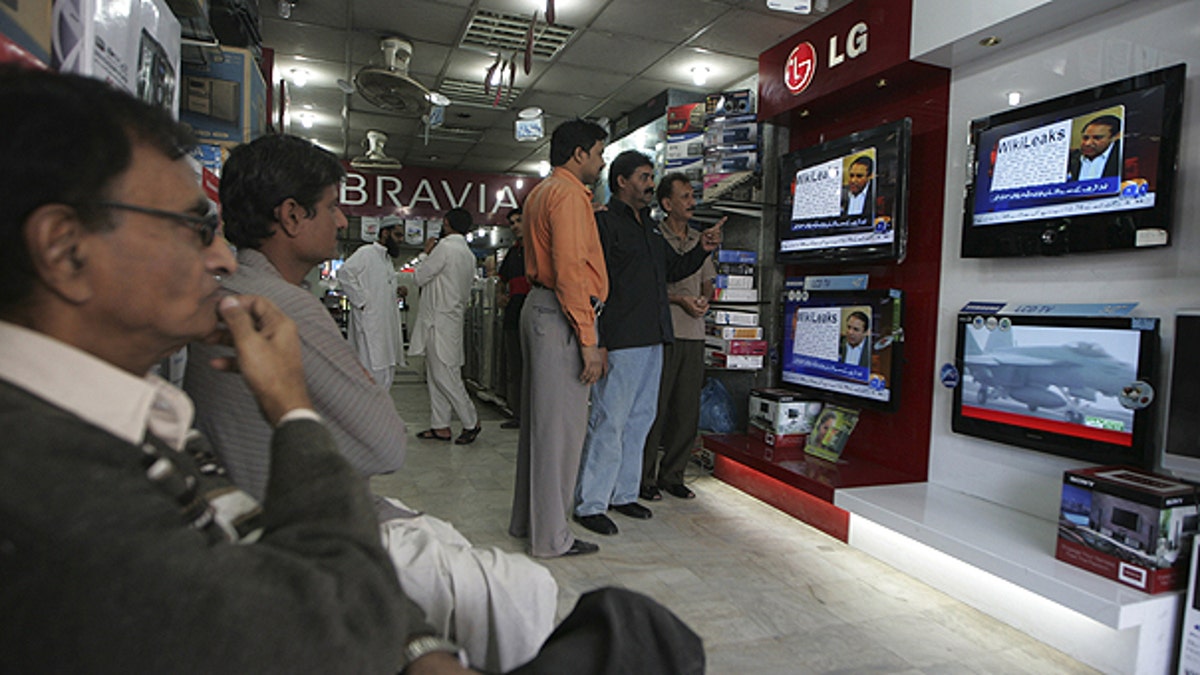
Dec. 2: People watch Wikileaks memos at an electronic shop in Karachi, Pakistan. (AP)
CAIRO – The United States has been pushing its powerhouse ally Saudi Arabia to help stabilize Pakistan and Afghanistan, but it has struggled to overcome the kingdom's deep mistrust of Pakistan's president and doubts over U.S. strategy for reining in militants, leaked U.S. diplomatic memos show.
Saudi Arabia has long had enormous influence in Pakistan and Afghanistan, using its petro-wealth and religious ties to Islamic hard-liners in both countries. The kingdom was one of only two countries to recognize the former Taliban government in Afghanistan and still has connections to Taliban figures.
But Saudi Arabia has been cautious in mediating between the Taliban and the U.S.-backed Afghan government. A 2008 effort to get the two sides together in the Saudi holy city of Mecca collapsed, and earlier this month Saudi Foreign Minister Saud al-Faisal said the kingdom would not mediate with the Taliban unless the movement broke its ties with al-Qaida and Osama bin Laden.
The memos released on the WikiLeaks website this week show differences in strategy between Washington and Saudi Arabia. American diplomats have been pressing the kingdom to throw its weight behind President Asif Ali Zardari with financial aid and intelligence help against the Pakistani Taliban and militant groups who have been crossing the border into Afghanistan to battle NATO and Afghan troops.
The pressure seems to have brought some grudging progress. But Saudi officials appear wary of aggressive action by the Pakistani military against insurgents in Pakistan, advising instead greater outreach to unruly tribes to rein in militants. Above all, they seem convinced Zardari is too corrupt to keep the country together — and would prefer a military strongman or Saudi Arabia's top ally in Pakistan, former prime minister and now opposition leader Nawaz Sharif.
Saudi King Abdullah told President Barack Obama's then-national security adviser James Jones in a January 2009 meeting that Zardari is "an impediment to denying terrorist safe havens ... 'a rotten head' that was infecting the whole body," according to a report by the U.S. ambassador in Riyadh.
At the same time, Foreign Minister Saud told Jones that "we must reach out to tribal leaders and separate those we could work with from those we must fight," and warned that the Pakistani military could lose its credibility among tribes if it is used to fight extremists.
A Pakistani presidential spokesman in Islamabad dismissed the reported comments, saying Zardari regards the Saudi king "as his elder brother."
But since Zardari came to office in 2008, Pakistani diplomats have felt the coldness.
The Pakistani ambassador to Riyadh, Umar Khan Alisherzai, complained to the Americans that the Saudis perceive Zardari as "pro-Iranian and pro-Shia, which made them apprehensive about working with him." Sunni-dominated Saudi Arabia is deeply worried about mainly Shiite Iran's growing influence in the Middle East and Afghanistan-Pakistan region and fears Tehran is seeking to build a nuclear weapon, an accusation Iran denies.
"We have been punished by Saudi Arabia because our president talks to the Iranians," Alisherzai said, according to an October 2009 memo.
Instead, Saudi Arabia has pushed for a greater role for Sharif, who spent years in exile in Saudi Arabia and who has close ties with Islamic hard-liners in Pakistan. In 2008, before Zardari's election, Saud touted Sharif as "a force for stability" able to talk to "religious extremists who are not usually open to dialogue," according to another U.S. Embassy memo.
As recently as February, the Saudis were promoting Sharif, saying he could "play a great role in working with tribal chiefs" and arguing that "money is better than bullets in the fight against the Taliban," the embassy reported.
In March last year, Obama's special representative to Afghanistan and Pakistan, Richard Holbrooke, pressed Saudi officials to work with Zardari, warning that instability could lead to Pakistan's nuclear weapons falling into the wrong hands.
Holbrooke said U.S.-Saudi cooperation on Pakistan "needed to rise to a higher level." He urged the kingdom to provide economic assistance to Pakistan and help get Zardari and Sharif to work together, according to an embassy report on his talks with Saudi Deputy Interior Minister Prince Mohammed bin Nayef, a senior counter-terror chief.
Nearly a year later, in February, the U.S. Embassy reported some progress, noting "close military and intelligence cooperation" between Saudi Arabia and Pakistan and greater economic aid, with Saudi Arabia disbursing at that time half of $700 million it pledged to Pakistan.
It also said the kingdom had begun taking action against Saudis who send funding the Taliban and the Pakistani militant group Laskhar-e-Taiba.
Still, it said, the Saudis were frustrated in efforts to reconcile between Sharif and Zardari, complaining that "compromise seemed alien to Pakistan politicians."
"The Saudis generally agree that there is a need to deny terrorists safe havens in Pakistan, but question whether the methods we have outlined will be effective," Ambassador James B. Smith wrote. "The tumultuous democratic process in Pakistan makes the Saudis nervous, and they appear to be looking for 'another Musharraf': a strong, forceful leader they know they can trust," he added, referring to former Pakistani strongman Gen. Pervez Musharraf.
